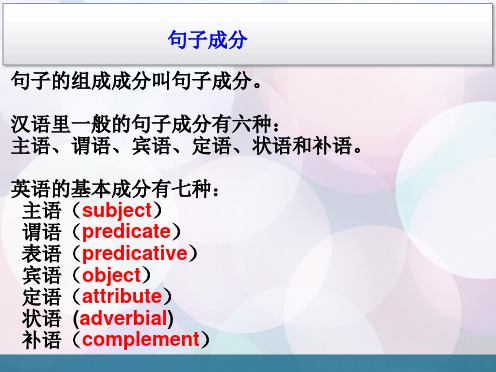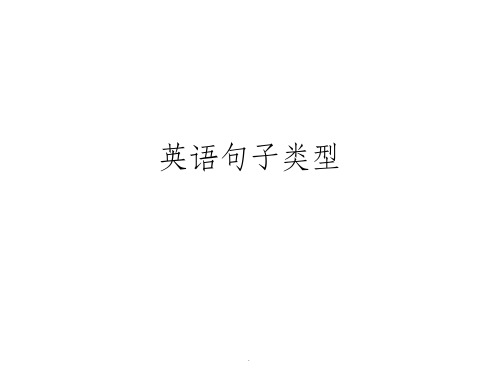英语句子种类 ppt课件
合集下载
句子的种类(50张PPT)初中英语专项复习课件

2.一般疑问句的回答 一般疑问句的肯定回答通常用“Yes,主语+be动词/情态动词/助动词”; 否定回答通常用“No,主语+be动词/情态动词/助动词+not”。not 习 惯上与前面的be动词、情态动词或助动词构成缩写词,但是be动词am 除 外。
三、选择疑问句 1.选择疑问句的回答 选择疑问句一般不用yes或no回答,而是选择一种情况回答。如: —Which one do you prefer,the red one or the blue one? 你更喜欢哪一件,红色的还是蓝色的? —I prefer the red one.我更喜欢红色的。
3.表示部分否定的词,如not all,not everything,not everybody,not everywhere,not always等。如: Not all students go to school by bike.不是所有的学生都骑自行车上 学。 4.宾语从句的否定形式:当主语为第一人称,谓语为 think,believe,suppose等词时,形式上否定主句实则否定宾语从句。如: I don’t think he’ll come. 我认为他不会来。
答案 A
解析 考查动词时态,本句为陈述句。句意:自从我来到长沙我们就没见过
面,但我们经常发邮件。根据since I came to Changsha可知,句子时态
为现在完成时,其构成为:have/has+动词过去分词,故选A项。
考点清单
分类
意义
肯定句
表示肯定的陈述
否定句
表示否定的陈述
例句
I get up at 6 o’clock every morning. 我每天早上六点起床。
英语句子成分及五种基本句型ppt课件

基本句型1:主+谓
例句A 世界每天都在改变。 例句 B 她的舞跳得很好。
例句C 月亮升起了。
例句D 这支笔书写流利。
资金是运动的价值,资金的价值是随 时间变 化而变 化的, 是时间 的函数 ,随时 间的推 移而增 值,其 增值的 这部分 资金就 是原有 资金的 时间价 值
系动词:be动词+其它含有特殊意义的动词
五种基本句型:
1 主+谓 2 主+系+表 3 主+谓+宾 4 主+谓+间宾+直宾 5 主+谓+宾+宾补
资金是运动的价值,资金的价值是随 时间变 化而变 化的, 是时间 的函数 ,随时 间的推 移而增 值,其 增值的 这部分 资金就 是原有 资金的 时间价 值
什么是主语?
1)主语:是一个句子的老大。 是一句的主体,是在句中说明全句中心的部分。 常用名词,代词,不定式,动名词或从句充当担任。一 般放于句首。如:
1. 每天大声的朗读(read aloud)是很重要的。 2. 跟你聊天真是一场噩梦(nightmare)。
资金是运动的价值,资金的价值是随 时间变 化而变 化的, 是时间 的函数 ,随时 间的推 移而增 值,其 增值的 这部分 资金就 是原有 资金的 时间价 值
练习:句子结构分析
划分下列句子的成分,并指出它们分别属于哪种基本句型。 A mooncake is a delicious and round cake. There are many different kinds of mooncakes. It is a good habit to do morning exercises. It is difficult for him to give up smoking. Trees turn green in spring. He sat there quietly. The apples tasted sweet. The sun rises in the east.
例句A 世界每天都在改变。 例句 B 她的舞跳得很好。
例句C 月亮升起了。
例句D 这支笔书写流利。
资金是运动的价值,资金的价值是随 时间变 化而变 化的, 是时间 的函数 ,随时 间的推 移而增 值,其 增值的 这部分 资金就 是原有 资金的 时间价 值
系动词:be动词+其它含有特殊意义的动词
五种基本句型:
1 主+谓 2 主+系+表 3 主+谓+宾 4 主+谓+间宾+直宾 5 主+谓+宾+宾补
资金是运动的价值,资金的价值是随 时间变 化而变 化的, 是时间 的函数 ,随时 间的推 移而增 值,其 增值的 这部分 资金就 是原有 资金的 时间价 值
什么是主语?
1)主语:是一个句子的老大。 是一句的主体,是在句中说明全句中心的部分。 常用名词,代词,不定式,动名词或从句充当担任。一 般放于句首。如:
1. 每天大声的朗读(read aloud)是很重要的。 2. 跟你聊天真是一场噩梦(nightmare)。
资金是运动的价值,资金的价值是随 时间变 化而变 化的, 是时间 的函数 ,随时 间的推 移而增 值,其 增值的 这部分 资金就 是原有 资金的 时间价 值
练习:句子结构分析
划分下列句子的成分,并指出它们分别属于哪种基本句型。 A mooncake is a delicious and round cake. There are many different kinds of mooncakes. It is a good habit to do morning exercises. It is difficult for him to give up smoking. Trees turn green in spring. He sat there quietly. The apples tasted sweet. The sun rises in the east.
英语句子类型(简单句、并列句、复合句)ppt课件

• ①He helps me and he also helps others. • ②She not only gave us a lot of advice, but also
helped us to overcome difficulties. • 2.表示转折关系,常用连词有but,however, yet(然
而),while(而)等。 • ①He is young, but he works hard. • ②She is tall, while her elder sister is short.
.
并列句
• 3.表示选择关系,常见连词有or,not...but(不是…… 而是……),either...or...(要么……要么……)等。
关系词whose实际上是先行词的所有格
4.The school where I study is far from my home.
I
bought
a hat
yesterday.
The children ran
home.
We
ate
our meal
in silence.
The car
stopped
suddenly.
.
并列句
• 由并列连词把两个或两个以上的简单句连接起来的句子叫 并列句。常见分类:
• 1.表示同等、平行或承接关系,常用连词有and, both...and...,not only...but also..., neither...nor...,as well as等。
The teacher asked me to read the passage. 6. There be句型:
There is a book on the desk. There existed many dinosaurs.
helped us to overcome difficulties. • 2.表示转折关系,常用连词有but,however, yet(然
而),while(而)等。 • ①He is young, but he works hard. • ②She is tall, while her elder sister is short.
.
并列句
• 3.表示选择关系,常见连词有or,not...but(不是…… 而是……),either...or...(要么……要么……)等。
关系词whose实际上是先行词的所有格
4.The school where I study is far from my home.
I
bought
a hat
yesterday.
The children ran
home.
We
ate
our meal
in silence.
The car
stopped
suddenly.
.
并列句
• 由并列连词把两个或两个以上的简单句连接起来的句子叫 并列句。常见分类:
• 1.表示同等、平行或承接关系,常用连词有and, both...and...,not only...but also..., neither...nor...,as well as等。
The teacher asked me to read the passage. 6. There be句型:
There is a book on the desk. There existed many dinosaurs.
句子的种类(22张PPT)初中英语专项复习课件

English is the easiest subject to learn
5.is, a, what, useful, it, subject__________________________!
What a useful subject it is
6.you, her, do, remember______________________?
考点3 祈使句
祈使句表示命令、请求、建议或劝告等。其主语通常被省略,谓语动词用原形,句末用句号或感叹号。
肯定祈使句
1.(Please)+动词原形+其他Listen to English songs when you are free.
2.Let+第一、三人称的宾格/名词+动词原形+其他Let the students come in!
What present did you buy
15.out, who, find, help, needs_________________________.
Find out who needs help
感谢您的观看
Do you remember her
7.it, when, you, did, take______________________?
When did you take it
8.beautiful, look, the, at, flowers____________________________.
What引导的感叹句
1.What + a/an + 形容词 + 可数名词单数形式(+ 主语 + 谓语)!●What a beautiful skirt!●What an exciting speech our headmaster gave just now![2022滨州中考]
5.is, a, what, useful, it, subject__________________________!
What a useful subject it is
6.you, her, do, remember______________________?
考点3 祈使句
祈使句表示命令、请求、建议或劝告等。其主语通常被省略,谓语动词用原形,句末用句号或感叹号。
肯定祈使句
1.(Please)+动词原形+其他Listen to English songs when you are free.
2.Let+第一、三人称的宾格/名词+动词原形+其他Let the students come in!
What present did you buy
15.out, who, find, help, needs_________________________.
Find out who needs help
感谢您的观看
Do you remember her
7.it, when, you, did, take______________________?
When did you take it
8.beautiful, look, the, at, flowers____________________________.
What引导的感叹句
1.What + a/an + 形容词 + 可数名词单数形式(+ 主语 + 谓语)!●What a beautiful skirt!●What an exciting speech our headmaster gave just now![2022滨州中考]
句子的种类(20张PPT)初中英语专项复习课件

他?
(2)特殊疑问句
用特殊疑问词(组)引导的疑问句叫作特殊疑问句,回答时不能使用yes或no,
而是根据实际情况作答。
疑问词(组)
含义及用法
例句
who which what
“谁”,询问身份
“哪一个”,询问特定的人或 物 “什么”,询问职业或身份等
Who is the man under the tree? 树底下的那个男人是谁? Which book do you like?你喜欢 哪一本书? —What is he?他是干什么的? —He's a teacher.他是一名教师。
句子的种类
初中英语专项复习
1.陈述句
构成
谓语动词不含否定词。分为两 肯定 形式 种,一种为正常语序,一种为倒
装语序
例句 ①My parents are both doctors. 我的父 母都是医生。 ②In the center of the city is a big park.这个城市中心有一个大公园。
Tom doesn't like playing the piano. 汤 姆不喜欢弹钢琴。
构成 除not外,使用其他否定词也可构 成否定句,如no,never, 否定 形式 seldom,hardly,nothing, neither,nobody,few,little, nhave never been to Shanghai. 我从 来没有去过上海。 ②None of these pens works/work. 这 些钢笔没有一支能用。
11.(2023吉林改编)—__H_o_w__f_a_r_ is it from our school to the new bookstore, Li Lei? —Only one kilometer. 12.(2023营口改编)—Lingling, _h_o_w___s_o_o_n_ will your brother come back from abroad? —Hmm, in a week. 13.(2023宿迁改编)—China won all the gold medals at the 2023 World Table Tennis Championships. —_W__h_a_t_exciting news!
句子种类和类型 (ppt)(共13张PPT)

感叹句、THERE-BE存在句
第3页,共13页。
1、陈述句 说明一个事实或陈述一个看法,有肯定式和否定 式,语序是主语在前,位于在后。
She arrived early.
She cannot have arrived now. 注:1)半否定句
I hardly know anything about it.
How foolish she is!
Can’t I hardly know anything about it. you understand it?
1)一般疑问句 用来询问一件事,答案通常是yes或 no,注意语序。
How clearly you speak!
Isn’t it a beautiful lake? You need to come, ______ you?
you
been
toቤተ መጻሕፍቲ ባይዱ
the
UK?
no,
---No, I haven’t.
第5页,共13页。
2)特殊疑问句 疑问词有
who,whose,what,which,where,when,why,how等。
(1)陈述语序 Who was the first man in space?
(2)倒装语序 Who are you talking about?
2)带第一、三人称的祈使句
Let me try again. Let’s go. Let us go.
Let’s not say anything about it./Don’t let’s say… Let him be here by 10 o’clock.
第10页,共13页。
3、祈使句
2)特殊疑问句 疑问词有who,whose,what,which,where,when,why,how等。
第3页,共13页。
1、陈述句 说明一个事实或陈述一个看法,有肯定式和否定 式,语序是主语在前,位于在后。
She arrived early.
She cannot have arrived now. 注:1)半否定句
I hardly know anything about it.
How foolish she is!
Can’t I hardly know anything about it. you understand it?
1)一般疑问句 用来询问一件事,答案通常是yes或 no,注意语序。
How clearly you speak!
Isn’t it a beautiful lake? You need to come, ______ you?
you
been
toቤተ መጻሕፍቲ ባይዱ
the
UK?
no,
---No, I haven’t.
第5页,共13页。
2)特殊疑问句 疑问词有
who,whose,what,which,where,when,why,how等。
(1)陈述语序 Who was the first man in space?
(2)倒装语序 Who are you talking about?
2)带第一、三人称的祈使句
Let me try again. Let’s go. Let us go.
Let’s not say anything about it./Don’t let’s say… Let him be here by 10 o’clock.
第10页,共13页。
3、祈使句
2)特殊疑问句 疑问词有who,whose,what,which,where,when,why,how等。
初中英语句子种类讲解(PPT52张)
newspaper when I
came in. ❖She is the girl who
sings best of all.
定语从 句
❖It is well-known that the 2008 Olympic Games will be held on August 8th.
主语从句
❖As is known to all, the
neither…. nor…. ▪ 转折并列连词: but,while,yet
▪ 因果并列连词: for, so
▪ 选择并列连词: or
请用合适的并列连词把每组句子合
并为一个并列句。 1.He was tired. He went to bed.
He was tired, so he went to bed.
<2>. Do you know what w\as
happened yesterday? (改错)
3. _主__语___+__谓__语__+__宾__语___(_S_+V+O)
We are having an English class.
Mr Wang will attend the lecture.
★高考经常考查的系动词:
<1>. “变得”g_e_t____b,e_c_o__m_e__,
_t_u_r_n___, _g_o_____, _g_r_o_w_...
<2>. “看起来”lo_o__k___s,_e_e_m___,_a_p_p__e_ar “闻起来”s_m__e_ll__ “尝起来”taste
感叹句结构
感叹句通常有what, how引导,表示赞美、惊
句子的种类(52张PPT)初中英语专项复习课件
助动词/情态动词+主语+ night?
谓语+其他?
Why can’t you answer the
question?
续表
The red one.
特殊疑 问句
答语
根据实际情况作出相应的 回答
My key to the bike. I went to the park with
my
friends.
Because it is too difficult.
谓语 是否定中心成分,则仍视 I have told you not to play
动词 为肯定句,附加疑问句部 computer games so much,
分用否定结构
haven’t I?
续表
反意疑 问句
若陈述句部分含有否定
附加 前、后缀,如un-, dis-, 疑问 -less等构成的词,该陈述 He is unhappy, isn’t he? 句部 句仍然视为肯定句,附加
反意疑 问句
陈述句(肯定式)+附加 结构 疑问句(否定式)?
陈述句(否定式)+附加 疑问句(肯定式)?
You are from Guilin, aren’t you? You didn’t get up at 6:00, did you?
续表
反意疑 问句
与一般疑问句的答语相 同,但注意在回答“前否 答语 后肯”的反意疑问句时, yes和no在意义上的变化 (此时yes的意思是 “不”,no的意思是“是”)
式)
—Neither is Jenny.
So+主语+ 助动词/情态动词/be动词. 意思 —Li Ming is a brave boy. 是:主语确实如此(和前面的情况相符) —So he is.
英语的六种基本句型ppt课件
• 她打算在即将到来的“五一”外出旅游。
• 4) I don’t know what I should do next. (从句)我 认识到了贫困户贫困的根本原因,才能开始对症下药,然后药到病除。近年来国家对扶贫工作高度重视,已经展开了“精准扶贫”项目 不知道下一步该干什么
• 5)You can put the books in your bag.你可以把 书放在书包里。
• 6. What he said does not matter. 他所讲的没有什么关系。 • 7. They talked for half an hour. 他们谈了半个小时。 • 8. The pen writes smoothly. 这支笔书写流利。
•
主语n/pron 认识到了贫困户贫困的根本原因,才能开始对症下药,然后药到病除。近年来国家对扶贫工作高度重视,已经展开了“精准扶贫”项目
个队员平躺在操场上。
• 4)We should remain modest and prudent any time.我们在任何时候都应该保持谦虚谨慎。
• 5) I feel hungry. /The cloth feels smooth.
• 6)The picture looks more beautiful at a certain distance.这幅画在一定的距离Байду номын сангаас更漂亮一些。
宾语 + for sb.; 2)动词 + 宾语+to sb.。
• Please show me your picture. =Please show your picture to me. 请把你的画给我看一下。
• I'll buy you a computer as long as you don t lose heart.
• 4) I don’t know what I should do next. (从句)我 认识到了贫困户贫困的根本原因,才能开始对症下药,然后药到病除。近年来国家对扶贫工作高度重视,已经展开了“精准扶贫”项目 不知道下一步该干什么
• 5)You can put the books in your bag.你可以把 书放在书包里。
• 6. What he said does not matter. 他所讲的没有什么关系。 • 7. They talked for half an hour. 他们谈了半个小时。 • 8. The pen writes smoothly. 这支笔书写流利。
•
主语n/pron 认识到了贫困户贫困的根本原因,才能开始对症下药,然后药到病除。近年来国家对扶贫工作高度重视,已经展开了“精准扶贫”项目
个队员平躺在操场上。
• 4)We should remain modest and prudent any time.我们在任何时候都应该保持谦虚谨慎。
• 5) I feel hungry. /The cloth feels smooth.
• 6)The picture looks more beautiful at a certain distance.这幅画在一定的距离Байду номын сангаас更漂亮一些。
宾语 + for sb.; 2)动词 + 宾语+to sb.。
• Please show me your picture. =Please show your picture to me. 请把你的画给我看一下。
• I'll buy you a computer as long as you don t lose heart.
英语句子种类ppt课件
few, nothing, nobody, seldom 等否定词,后面用肯定
You have nothing to tell me, do you? She has few money with her, does she?
反意
疑问 句
当前部分为祈使句,后面用
will you; 而当前面是Let’s开头,后
当主句是I /we
doesn’t she ?
think/believe/suppose时要以 I think he is wrong this time ,
从句为主
isn’t he ?
祈使句
提出请求、建议或发出命令等。以动词
原形开头(否定形式在前面加Don’t),常在
句首或句末加上please。如:Sit down, please.
Don’t talk in class 4)感叹句:How clever the boy is!
疑问句
用来提出问题的句子。包括一般疑问句、
特殊疑问句、选择疑问句和反意疑问句
问句类型
解析
例句
一般疑 问句
特殊疑 问句
选择疑 问句
以be动词、助动词或 情态动词开头,用Yes 或No来回答。
Did you have a good time at school? Can you finish your work on time?
time and you’ll have enough time to have
breakfast. —OK, Muni I’ll remember.
A. Get up B. Getting up
C. To get up D. Got up
★ 感叹句
You have nothing to tell me, do you? She has few money with her, does she?
反意
疑问 句
当前部分为祈使句,后面用
will you; 而当前面是Let’s开头,后
当主句是I /we
doesn’t she ?
think/believe/suppose时要以 I think he is wrong this time ,
从句为主
isn’t he ?
祈使句
提出请求、建议或发出命令等。以动词
原形开头(否定形式在前面加Don’t),常在
句首或句末加上please。如:Sit down, please.
Don’t talk in class 4)感叹句:How clever the boy is!
疑问句
用来提出问题的句子。包括一般疑问句、
特殊疑问句、选择疑问句和反意疑问句
问句类型
解析
例句
一般疑 问句
特殊疑 问句
选择疑 问句
以be动词、助动词或 情态动词开头,用Yes 或No来回答。
Did you have a good time at school? Can you finish your work on time?
time and you’ll have enough time to have
breakfast. —OK, Muni I’ll remember.
A. Get up B. Getting up
C. To get up D. Got up
★ 感叹句
- 1、下载文档前请自行甄别文档内容的完整性,平台不提供额外的编辑、内容补充、找答案等附加服务。
- 2、"仅部分预览"的文档,不可在线预览部分如存在完整性等问题,可反馈申请退款(可完整预览的文档不适用该条件!)。
- 3、如文档侵犯您的权益,请联系客服反馈,我们会尽快为您处理(人工客服工作时间:9:00-18:30)。
、
He got up, dressed quickly, washed himself and went out.
句 子 类
Is he a superman?
型
Don’t be shy. Have a try.
The man dressed in bห้องสมุดไป่ตู้ack seems to be a spy.
Vi(不及物动词)
yellow; go bad; come true 3.表示状态保持的动词: stay healthy; keep warm; remain保持 be (am,is.are,was,were)是 ;seem似乎
David
a zookeeper
We call the man ‘David’.
S V DO
He keeps me waiting.
常见的可接动词-ing形式作宾补的动词有: Keep 和 see,hear,feel,watch,find… V + O + OC (V sb doing sth)
He spoke loudly to make himself heard. 常见的可接动词-ed形式作宾补的动词有: Have, make, get,see,hear,feel,watch,find… V + O + OC (V sb done)
OC(宾补) Object
I make him angry.
Complement
S
V DO OC
He tells us to protect the birds
S V DO
OC
S + V + DO + OC
主 +谓 + 宾+宾补
We call the man David 就是是否存在逻辑
DO
OC 上的主系表关系
English Grammar
Sentences
cherry
英语句子的种类(按交际用途)
陈述句(说明一个事实或陈述一个看
法,有肯定式和否定式,语序是主语在
前,谓语在后。 )
疑问句(一般疑问句、特殊疑问句、选 择疑问句、反义疑问句) 祈使句 (表达命令、要求、请求、劝 告等,用原形)
英语句子的种类(按交际用途)
DO
OC
此处为 带to的动词不定式做宾补
主 +谓 + 宾+宾补句型 简称 主谓宾补
1 仅仅使用主谓宾无法说明完整句意 必须添加补足语补充说明宾语情况 就是我们常见的 动词+ sb + to do 词组
He tells us to protect the birds. 常见的可接带to不定式宾补的动词有: tell,ask,want,would like,wish,teach,invite… V + O + OC (V sb to do sth)
常见的连系动词
1.表示感觉的动词5个---翻译为 …起来 feel感到 excited; smell good; taste delicious; sound interesting; look happy 2.表示变化的动词:有固定的搭配 get smaller; grow older; become stronger; turn
3 、祈使句:
Be careful, boys; Don’t talk in class
4 、感叹句:How clever the boy is!
II、句子类型(按句子结构分) 简单句、并列句、复合句、并列复合句
1、简单句 只包含一个主谓结构,个个成 分都是单词或短语的句子。
二
All roads lead to Rome.
1 、陈述句(肯定、否定):
He is six years old; She didn’t hear of you before.
2 、疑问句(一般、特殊、选择、反意)
Do they like skating? How old is he? Is he six or seven years old? Mary can swim, can’t she?
My deskmate often makes me laugh.
常见的可接不带to不定式当宾补的动词有:
一感二听三让五看” feel,/ hear, listen to, / let, make, have, /look at, see, , watch, notice, observe
V + O + OC (V sb do sth)
SV
DO
It has a hooked beak.
SV
DO
It is lovely.
S
It looks strong.
表语:表示主 语是什么(身 份)或者怎么 样(处于什么 状态)
SV
P(表语)
linking verbs(系动词)
Predicative
系动词
表语
必须是这三类专门的词,而且必须表达这个特殊的 含义时才是系动词。
be (am is are was were) / seem / keep /…是/好象 (似乎)是/保持
look / feel / taste / smell / sound / …看/感觉/尝/闻 /听起来(上去)
become / turn / get / grow / …变得
I like the golden eagle.
主 语
谓 语
Vt(及物动词)
宾语 宾语(直) 宾语(间)
宾语 宾补
系动词
表语
简单句(Simple Sentences) 就是只包含一个主谓结构的句子
英语中千变万化的句子归根结底都是由简单句的五 种基本句型组合、扩展、变化而来的,只要把这些基 本句型弄清楚,你就会游刃有余了
→1. S + V(lv) + P 主语+ 谓语(系动词) + 表语
the man is David
此处为 名词宾补
S + V + DO + OC 主 +谓 + 宾+宾补句型
1 仅仅使用主谓宾无法说明完整句意 必须添加补足语补充说明宾语情况 判断标准是在DO和OC中间可否加be动词
可接名词宾补的动词有call/elect/name/find…
He tells us to protect the birds
感叹句(由what 或how引导的,表 示惊奇、愤怒、赞赏、喜悦) THERE-BE存在句
英语句子的种类(按结构)
简单句 (simple sentence)
并列句 (compound sentence) 复合句 (complex sentence)
I、句子种类(按交际用途分)
陈述句、疑问句、祈使句、 感叹句、THERE-BE存在句
